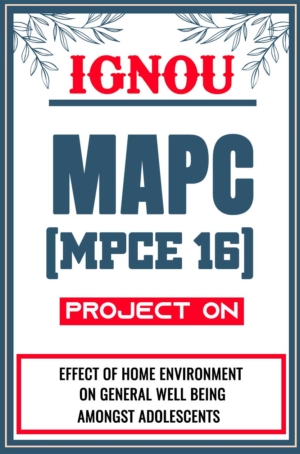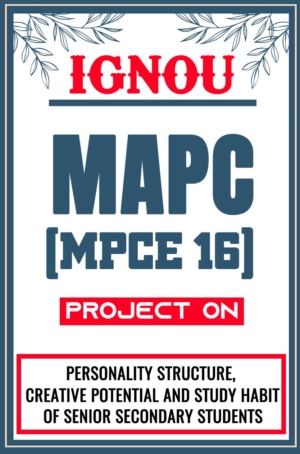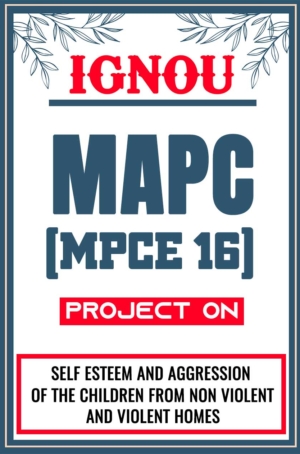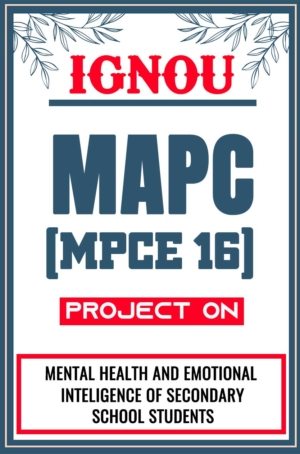Buy IGNOU MPCE 16 Project for MAPC
The IGNOU MPCE 16 project is an important part of the Master of Arts in Psychology (MAPC) curriculum. It requires students to perform their own study on a specific psychological topic. The project is usually a dissertation or thesis that includes literature research, data collecting, analysis, and interpretation.
Whatsapp us to get the Personalized (Customized) IGNOU MPCE 16 Project Report and Synopsis
Download PDF Link for IGNOU MPCE 16 Project (MAPC)
The IGNOU MPCE 16 Project requires students to perform independent research on an Industrial and Organizational Psychology-related issue. This could include investigating employee behavior, motivation, job satisfaction, leadership, corporate culture, and other areas of workplace psychology. The project aims to assist students learn research skills such as problem identification, literature evaluation, data collecting, analysis, and report writing.
What are the key steps involved in completing the IGNOU MPCE 16 Project?
Completing the MPCE 16 Project involves several key steps to ensure a thorough and well-organized research endeavor. Here’s a breakdown of the essential steps:
Topic Selection:
- Choose a relevant and feasible topic related to Industrial and Organizational Psychology that aligns with your interests and career goals.
- Ensure the topic has sufficient scope for research and is significant to the field.
Proposal Development:
- Draft a project proposal outlining your research question, objectives, and methodology.
- Include a brief literature review to demonstrate the context and significance of your study.
- Obtain approval for your proposal from your academic advisor or project supervisor.
Literature Review:
- Conduct a comprehensive review of existing literature related to your research topic.
- Identify gaps in the current knowledge and position your research to address these gaps.
Research Design:
- Develop a research design, including your research methods (qualitative, quantitative, or mixed methods).
- Define your data collection tools, such as surveys, interviews, or observations.
Data Collection:
- Implement your research design and collect data according to the methods outlined in your proposal.
- Ensure ethical practices in data collection and obtain necessary permissions if required.
Data Analysis:
- Analyze the collected data using appropriate statistical or thematic analysis techniques.
- Interpret the results in the context of your research questions and objectives.
Report Writing:
- Write a detailed report presenting your research findings, analysis, and conclusions.
- Structure the report into sections such as introduction, literature review, methodology, results, discussion, and references.
Review and Revision:
- Review and revise your report to ensure clarity, coherence, and adherence to academic standards.
- Seek feedback from peers, advisors, or mentors and make necessary revisions.
Submission:
- Submit the final report according to the guidelines provided by IGNOU.
- Ensure all required documentation and forms are completed and submitted along with your report.
Presentation (if applicable):
- Prepare and deliver a presentation of your project findings if required by your course requirements or as part of your evaluation process.
Samples of IGNOU MPCE 16 Project topics for MAPC
- Marital Adjustment And Depression Among Working And Non-Working Women
- Academic Stress And Emotional Stability Among Obedient And Disobedient Students
- Study Of Depression And Suicidal Ideation Of Young And Middle Adulthood Women
- Occupational Stress, Job Burnout And Psychological Health Among Primary And High School Teachers
- Examination Anxiety In Relation To Self Esteem And Resilience Among Students
- Impact Of Social Media On Body Image, Self Esteem And Adjustment Level Of College Students
- A Study On Family Climate On Mental Health Of Students
- A Study Of Stress, Anxiety And Depression Among Nursing Students During Covid 19
What methods can be used for data collection and analysis in the IGNOU MPCE 16 Project?
Methods can be employed for data collection and analysis, depending on your research objectives and questions. Here’s an overview of some commonly used methods:
Data Collection Methods:
Surveys and Questionnaires:
- Purpose: Gather quantitative data on variables such as employee satisfaction, motivation, and organizational culture.
- Approach: Use structured questions with predefined response options (e.g., Likert scales) to collect data from a large sample.
Interviews:
- Purpose: Obtain in-depth qualitative data on individual experiences, opinions, and perceptions.
- Approach: Conduct one-on-one or group interviews with open-ended questions to explore participants’ viewpoints.
Observations:
- Purpose: Collect data on behavior and interactions in natural settings.
- Approach: Observe and record workplace behaviors and dynamics, either as a participant or a non-participant observer.
Case Studies:
- Purpose: Investigate a specific organization or group in detail.
- Approach: Use multiple data sources such as interviews, observations, and document analysis to understand complex issues within the case.
Focus Groups:
- Purpose: Explore group dynamics and collective views on specific topics.
- Approach: Facilitate discussions among a small group of participants to gather insights on their shared experiences and opinions.
Document Analysis:
- Purpose: Analyze existing records and documents related to organizational practices.
- Approach: Review internal reports, employee records, and other relevant documents to gain insights into organizational policies and practices.
Data Analysis Methods:
Statistical Analysis:
- Purpose: Analyze quantitative data to identify patterns, relationships, and trends.
- Approach: Use statistical tools and software (e.g., SPSS, Excel) to perform descriptive statistics, inferential statistics, correlation analysis, and regression analysis.
Thematic Analysis:
- Purpose: Analyze qualitative data to identify and interpret themes and patterns.
- Approach: Code interview transcripts, focus group discussions, and observational notes to categorize and analyze themes.
Content Analysis:
- Purpose: Systematically analyze the content of textual data.
- Approach: Identify and quantify specific content or themes within documents, interviews, or other text-based data.
Comparative Analysis:
- Purpose: Compare different data sets or groups to draw contrasts and similarities.
- Approach: Analyze data from different groups or time periods to assess differences and similarities in outcomes.
Narrative Analysis:
- Purpose: Understand how individuals make sense of their experiences through storytelling.
- Approach: Analyze personal narratives and stories to explore how participants construct meaning and interpret their experiences.
Factor Analysis:
- Purpose: Identify underlying variables that explain the patterns of correlations within a set of observed variables.
- Approach: Use statistical techniques to reduce data complexity and identify key factors affecting variables of interest.
What is the common challenges students face while working on the IGNOU MPCE 16 Project, and how can they be overcome?
Students working on the MPCE 16 Project often encounter several common challenges. Here’s a look at these challenges and strategies to overcome them:
Common Challenges and Solutions:
Topic Selection:
- Challenge: Choosing a relevant and feasible topic can be difficult. Students may struggle to find a topic that aligns with their interests and fits within the scope of Industrial and Organizational Psychology.
- Solution: Start by reviewing recent research and trends in the field to identify gaps or emerging areas. Consult with advisors or mentors to refine your topic idea and ensure it is both relevant and manageable.
Literature Review:
- Challenge: Conducting a comprehensive literature review can be overwhelming, especially with the vast amount of available research.
- Solution: Use academic databases and library resources to search for relevant studies. Organize your findings systematically and focus on the most pertinent literature. Create summaries and synthesize key points to help integrate them into your research.
Research Design:
- Challenge: Designing a robust research methodology that appropriately addresses research questions can be complex.
- Solution: Clearly define your research objectives and choose methods that best suit your study’s goals. Seek feedback from your advisor to ensure that your research design is sound and feasible.
Data Collection:
- Challenge: Collecting high-quality, reliable data can be challenging, especially if you face difficulties in accessing participants or dealing with low response rates.
- Solution: Develop a clear data collection plan and consider using multiple channels to reach participants. Pilot test your data collection tools to identify and address potential issues before the full-scale study.
Data Analysis:
- Challenge: Analyzing data can be complex, especially if students are not familiar with statistical or qualitative analysis techniques.
- Solution: Use statistical software (e.g., SPSS) or qualitative analysis tools (e.g., NVivo) to assist with data analysis. Take advantage of tutorials, workshops, or online resources to enhance your skills in data analysis.
Report Writing:
- Challenge: Writing a clear, well-structured report can be difficult, particularly in organizing complex data and findings.
- Solution: Follow the prescribed report structure and outline your sections before writing. Use clear, concise language and seek feedback from peers or advisors to improve clarity and coherence.
Time Management:
- Challenge: Managing time effectively can be a struggle, especially with other academic and personal commitments.
- Solution: Create a detailed project timeline with milestones and deadlines. Break down tasks into smaller, manageable steps and prioritize them to stay on track.
Feedback and Revisions:
- Challenge: Incorporating feedback and making necessary revisions can be daunting and time-consuming.
- Solution: Approach feedback constructively and systematically address each point. Plan for multiple rounds of revisions and allocate sufficient time to make improvements based on the feedback.
Ethical Issues:
- Challenge: Ensuring ethical practices in research, including obtaining informed consent and maintaining confidentiality, can be challenging.
- Solution: Familiarize yourself with ethical guidelines and obtain necessary approvals from ethics committees if required. Maintain transparency and adhere to ethical standards throughout your research.
What is the process for getting your IGNOU MPCE 16 Project proposal approved?
The process for getting your project proposal approved for the MPCE 16 Project generally involves several key steps. Here’s a detailed overview of the process:
1. Develop a Proposal:
- Draft Your Proposal: Prepare a comprehensive project proposal that includes the following elements:
- Title: A clear and concise title for your project.
- Introduction: Background information and rationale for the study.
- Research Objectives: Specific aims or questions your research intends to address.
- Literature Review: Summary of existing research related to your topic.
- Methodology: Detailed description of your research design, data collection methods, and analysis plan.
- Expected Outcomes: Anticipated findings and their potential impact.
- Timeline: A schedule outlining key milestones and deadlines.
2. Seek Advisor’s Guidance:
- Consult Your Advisor: Discuss your proposal with your academic advisor or project supervisor. They can provide feedback and suggest improvements to ensure your proposal meets academic standards and is feasible.
- Revise Proposal: Incorporate the feedback from your advisor and make necessary revisions to strengthen your proposal.
3. Prepare Supporting Documents:
- Ethical Approval: If your research involves human subjects, prepare an ethics review application, if required. Ensure you have informed consent forms and procedures in place.
- Additional Documentation: Gather any additional documents required by your institution, such as research consent forms or permissions.
4. Submit Proposal for Approval:
- Submit to Committee: Once your proposal is revised and finalized, submit it to the designated approval committee or department for formal review. This might be done through an online submission system or in-person.
- Include Documentation: Ensure that all required documents and forms are submitted along with your proposal.
5. Review and Feedback:
- Committee Review: The approval committee will review your proposal to ensure it meets academic and ethical standards.
- Receive Feedback: The committee may provide feedback or request further revisions. Be prepared to address any concerns or suggestions they raise.
6. Revise and Resubmit (if necessary):
- Make Revisions: Based on the committee’s feedback, revise your proposal accordingly. Address any issues or concerns they have highlighted.
- Resubmit: Submit the revised proposal and any additional documentation as requested by the committee.
7. Approval Notification:
- Receive Approval: Once the committee approves your proposal, you will receive official notification. This approval indicates that you can proceed with your research as outlined in your proposal.
- Begin Research: Start your project according to the approved proposal and timeline.
8. Ongoing Communication:
- Regular Updates: Maintain regular communication with your advisor and provide updates on your progress. This ensures that any issues are addressed promptly and keeps your project on track.
Ready to get your IGNOU MPCE 16 Project Report and Synopsis Sample PDF for MAPC?
- Call us or WhatsApp us at: 9958947060, 9354637830
- Visit: SHRICHAKRADHAR.COM
-
Sale!

-
Sale!

IGNOU MAPC Project (MPCE 16) Synopsis/Proposal & Project Report/Dissertation in Hard-Copy (Sample-9)
Original price was: ₹499.00.₹249.00Current price is: ₹249.00. -
Sale!

IGNOU MAPC Project (MPCE 16) Synopsis/Proposal & Project Report/Dissertation in Hard-Copy (Sample-8)
Original price was: ₹499.00.₹249.00Current price is: ₹249.00. -
Sale!

IGNOU MAPC Project (MPCE 16) Synopsis/Proposal & Project Report/Dissertation in Hard-Copy (Sample-7)
Original price was: ₹499.00.₹249.00Current price is: ₹249.00. -
Sale!

IGNOU MAPC Project (MPCE 16) Synopsis/Proposal & Project Report/Dissertation in Hard-Copy (Sample-6)
Original price was: ₹499.00.₹249.00Current price is: ₹249.00. -
Sale!

IGNOU MAPC Project (MPCE 16) Synopsis/Proposal & Project Report/Dissertation in Hard-Copy (Sample-5)
Original price was: ₹499.00.₹249.00Current price is: ₹249.00. -
Sale!

IGNOU MAPC Project (MPCE 16) Synopsis/Proposal & Project Report/Dissertation in Hard-Copy (Sample-4)
Original price was: ₹499.00.₹249.00Current price is: ₹249.00. -
Sale!

IGNOU MAPC Project (MPCE 16) Synopsis/Proposal & Project Report/Dissertation in Hard-Copy (Sample-3)
Original price was: ₹499.00.₹249.00Current price is: ₹249.00. -
Sale!

IGNOU MAPC Project (MPCE 16) Synopsis/Proposal & Project Report/Dissertation in Hard-Copy (Sample-2)
Original price was: ₹499.00.₹249.00Current price is: ₹249.00. -
Sale!

IGNOU MAPC Project (MPCE 16) Synopsis/Proposal & Project Report/Dissertation in Hard-Copy (Sample-1)
Original price was: ₹499.00.₹249.00Current price is: ₹249.00.










